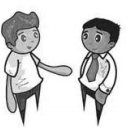Questões de Concurso
Sobre verbos | verbs em inglês
Foram encontradas 1.785 questões

QUESTION

Source: https://br.pinterest.com/pin/523332419172769962/
Accessed on 18/06/2018
4 Types of Deceptive Advertising
By Apryl Duncan
Deceptive advertising is officially defined
by the Federal Trade Commission (FTC) as “practices that have been found
misleading or deceptive. Specific cases include false oral or written
representations, misleading price claims, sales of hazardous or systematically
defective products or services without adequate disclosures, failure to
disclose information regarding pyramid sales, use of bait and switch
techniques, failure to perform promised services, and failure to meet warranty
obligations.

However, it’s important to note that deceptive advertising does not represent the entire industry, and makes up a very small percentage of the ads you will encounter every day. But there are always people out there looking to dupe consumers and make money in any way that they can. Here are some examples of deceptive and unethical advertising practices and scams that you need to look out for.
Often, hidden fees can be spotted by the asterisk (*) that accompanies the incredible deal. Guaranteed, there will be a big difference between “Only $99!” and “Only $99!*” That asterisk basically says “hey, this is not the final price, you will have to jump through major hoops or fork over a lot more cash.” So, if you see an asterisk, read the small print carefully. Whether it’s a small item, a car, or even a home, hidden fees are a deceptive way of luring you in. By the time you realize there’s more to pay, it can be too late.
For instance, suddenly the laptop you wanted is not in stock, but there is a different one that is lower spec and costs twice as much. Chances are that the original laptop was never in stock, or at least, not for the price advertised.
Another example would be advertising a car at the base price, but with all of the top-of-the-line features included in the ad. When you get to the dealership, you have to pay much more to get the car actually shown in the ad. Sometimes, an offer can feel like bait and switch but it’s not. If you want that laptop and it is sold out, but you are offered a similar laptop with a very similar spec, at an almost identical price, that’s perfectly fine. You just missed out on the original deal.
At no time do the hustlers break the law by making claims that are untrue, but the verbiage leads people to believe they are buying something way better than they’re actually getting. One of the cruelest was advertising a DIY model plane for a price that seemed like a steal. Things like “easy to assemble” and “it really flies” were on the box. But inside... it was just a blank sheet of paper, with a set of instructions on how to make a paper plane. Did they break the law? No. Did they deceive? Yes.
Food photography can suffer from the “best case scenario” photography. If you have ever ordered a burger from a fast food place, you will know this well. The burger on the menu is perfect. It’s thick, juicy, 4 inches high, and looks incredible. But the burger you receive, while it may have the same ingredients, is a sad interpretation of that image. The bun is flat, the burger is a mess, ketchup and mustard are pouring out of the sides.
This is something we accept as consumers because we know the burger in the photograph was assembled by expert designers and food artists, over the course of many hours, whereas the poor kitchen hand has to throw your burger together in a few seconds to meet your time demands. But, don’t take that to mean you can never complain about this kind of photography. If you buy something that is clearly of poorer quality than the item shown in the picture, you can demand a refund.(Adapted from www.thebalancecareers.com, February 02, 2019)
"The children went to the school." "She buys some clothes every weekend"

Bill: Why aren’t you coming out tonight? Zachary: Because I don’t have any money. If I ______, I with you Bill: Well, what about the movies tomorrow? Zachary: It depends. If my parents _____ me some money, ______ I . Bill: You always have an excuse! Why didn’t you come to Josh?s party last week? Zachary: I didn’t come because I lost my wallet and all my money. If I _____ my wallet, of course I _____ !

Instructions: answer the question based on the following text.

Source (adapted): https://www.bbc.com/news/worldafrica-50800864
I. The word “farmland” could be translated as “terras agrícolas”. II. The word “very” can be a verb. III. The word “crops” could be replaced by “plague”. Which ones are correct?
Instructions: answer the question based on the following text.

Source (adapted): https://www.bbc.com/news/worldafrica-50800864